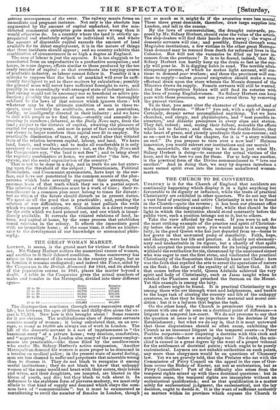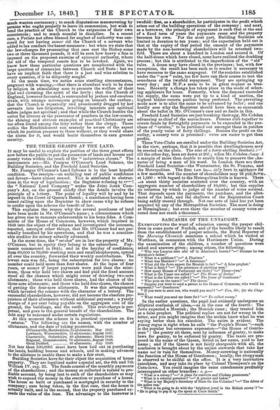THE CHURCH TO BE CONVERTED.
UrmucnY is it for the Church of England that accidents are continually happening which display it in a light anything but favourable to its dignity or influence, while the traits of practical Christianity are exhibited in other quarters. We do not say that a vast fund of practical and active Christianity is not to be found in the Church—quite the reverse ; it has been our pleasant office to record some shining examples : but, while that should be the light in which the institution should stand constantly before the public view, such a position belongs not to it, but to others. Take the view afforded by the week. If you were to ask for the most striking example of the practice and spirit of Christian- ity before the world just now, you would point to it among the laity, in the good Queen who has just departed from us—borne to her grave in that unwonted pomp of simplicity. Faith, hope, and charity, were her life and practice. A charity not eleemosy- nary and uncharitable in its rigour, but a charity of that spirit which accepted the precious ointment for its loving preciousness, withheld the retribution for sin, threatened by the unaccused sinner who was eager to cast the first stone, and vindicated the practical Christianity of the Samaritan that literally knew not Christ: hers was the faith that repelled the arts to arrest the operations of nature on the flesh ; the hope of the equality of all before God. In all that comes before the world, Queen Adelaide achieved the very spirit and body of Christianity, such as Jesus taught when he rebuked the Pharisees and preached the Sermon on the Mount. Yet this example is among the laity.
And others might be found. It is practical Christianity to go among those who err through want and helplessness, and buckle to the huge task of altering the country and life of the unhappy creatures, so that they be happy in their material and moral con- dition : but it is a layman that begins the task.
On the other hands the Church is prominent this week in a contest with one of its sons on a doctrinal point of difference—a litigant in a temporal law-court. We do not presume to say that the question at issue is of no importance to the doctrine of the Establishment ; but what we do say is, that it is most untoward that these disputations should so often recur, exhibiting the Church as an incessant litigant in the temporal courts—a Peter Peebles corporate—now disputing a doctrine with this clerk and now with that—before a secular judge too I No doubt, the mis- chief is caused in a great degree by the want of a proper tribunal for the settlement of doctrinal points; which ought to be purely ecclesiastical. Laymen are not suitable authorities on such points, any more than clergymen would be on questions of Chancery law. Yet we are gravely told, that the Prelates who sat with the Commission of Privy Council on the appeal in the case of Gor- ham versus the Bishop of Exeter, sat not as ecclesiastics, but as Privy Councillors ! Part of the difficulty also arises irom the temporal rights mixed up with these doctrinal questions : but in common sense, the temporal rights are incomplete without an ecclesiastical qualification ; and as that qualification is a matter solely for ecclesiastical judgment, the ecclesiastical, not the lay decision, ought to decide it. It is the want of sufficient authority on matters within its province which exposes the Church to much wanton contumacy ; to much disputatious maneuvering by persons who ought properly to leave its communion, but wish to bend the practice of the Church to the exigencies of their own consciences ; and to much scandal in discipline. In a recent case, a Prelate not often blamed for neglect of authority was cen- sured for not having sooner rid the Church of a servant who added to lax conduct the basest meanness : but when we state that the law-charges for prosecuting that case cost the Bishop some two or three thousand pounds, it will be seen how heavy a fine is imposed on the properest exercise of episcopal authority, where the aid of the temporal courts has to be invoked. Again, we know how these particular questions are complicated with the large question of connexion between Church and State : but we have an implicit faith that there is a just and wise solution to every question, if it be diligently sought. In the mean time, we notice some startling circumstances, pregnant with warning,—that there is abundant work to be done by religion in stimulating men to promote the welfare of their kind and elevating the spirit of the lowly ; that the Church of England, however favoured, is surrounded by jealous and emulous rivals, with strange movements going on beneath the surface ; that the Church is repeatedly and prominently dragged by her servants into law-litigation, involving interests not spiritual before judges not spiritual ; and that while the Church hustles the suitor for divorce or the prosecutor of poachers in the law-courts, the shining and obvious examples of practical Christianity are too often found among the laity rather than the clergy. Those within the Establishment can scarcely be aware of the aspect which its position presents to those without, or they would share the alarm for it, and would bestir themselves to earn greater security.



























 Previous page
Previous page